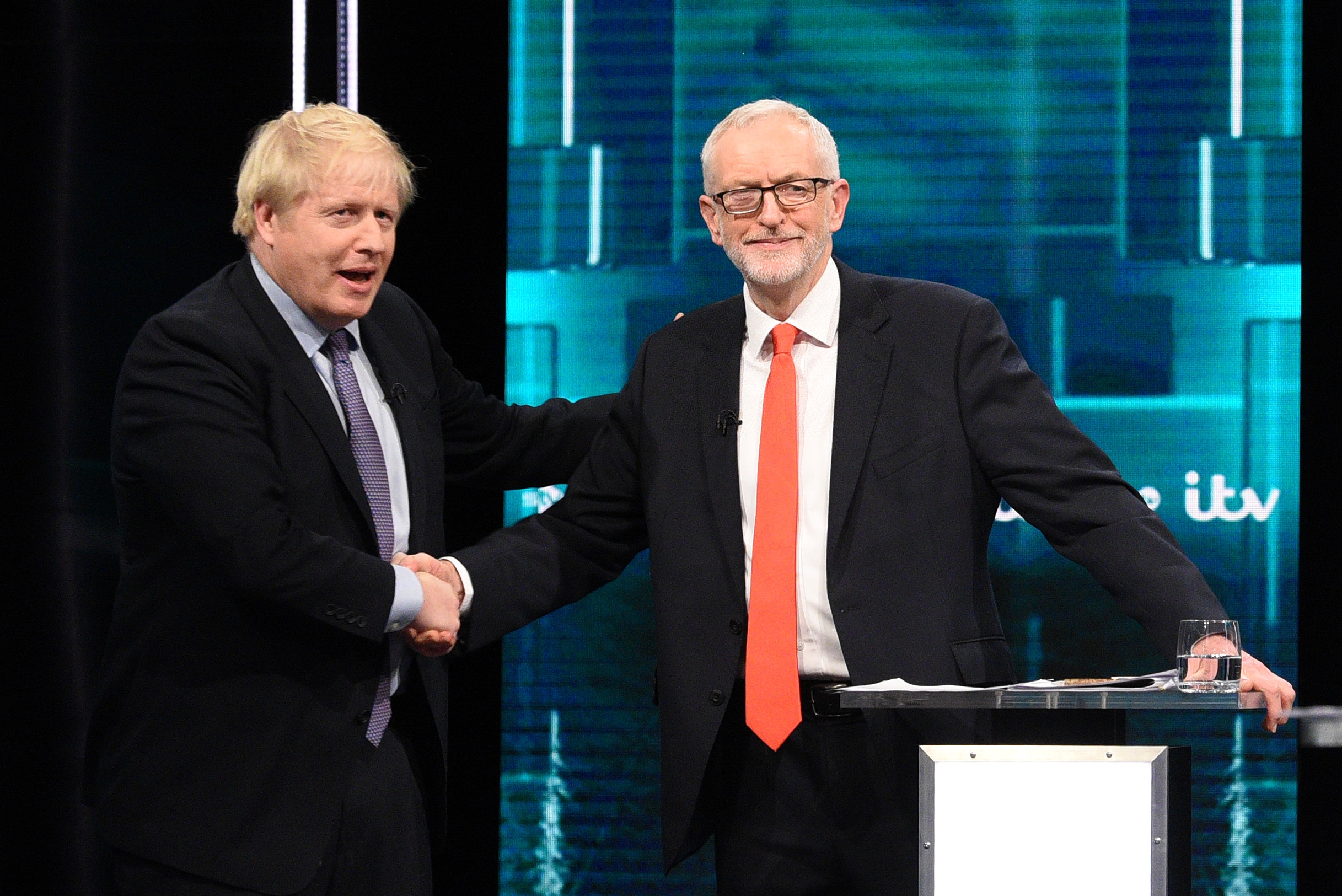UK PM trumps Labor leader in televised debate
- By Heiko Khoo
 0 Comment(s)
0 Comment(s) Print
Print E-mail China.org.cn, November 22, 2019
E-mail China.org.cn, November 22, 2019

A televised leaders debate between U.K. Prime Minister Boris Johnson and Labor leader Jeremy Corbyn took place on Nov. 19. In a snap poll of public opinion, 51% thought Johnson won compared to 49% for Corbyn. Johnson focused on his primary theme – getting Brexit done – while Corbyn tried to avoid the theme by focusing on social and economic issues.
During the debate, the audience expressed its exasperation at both politicians for the parliamentary paralysis and for the harsh invective that pervades British politics today. The public seems to yearn for a bygone age of relatively consensual politics.
Although few people trust him, Johnson's intransigent stance on Brexit, reinforced by months of orchestrated theatrical tussles with parliament, allows him to claim ownership of the subject. If the Tories get a majority, he says Brexit will be over on Jan. 31, 2020. After this, Johnson promises a new optimistic era for Britain – one where the British would redesign their own international trade relations and agreements. This narrative has the advantage of coherence and simplicity, even if it breaks down under forensic scrutiny.
By contrast, Corbyn is playing a delicate balancing act on Brexit. Although he campaigned to Remain in the EU in the 2016 referendum, he publicly weighed up the pros and cons of EU membership, supporting a "remain and reform" agenda. However, most Labor MPs uncritically defend the EU, and many have campaigned to overturn the referendum result or to demand a second confirmatory referendum. Eventually, the Labor party conference adopted a policy that a Labor government would renegotiate a deal with the EU, and then offer the public a "credible choice" between that deal and remaining in the EU. This excludes the possibility that Britain might "crash out" of the EU without a deal, whereas both Theresa May and Boris Johnson claimed that the threat of "walking away" was essential in negotiations with the EU.
The nationalist sentiments whipped up by the Brexit referendum were linked to an anti-establishment wave in Britain and internationally. The veteran Brexit campaigner Nigel Farage championed this angry cause. Ardent Brexiteers identify EU bureaucrats, petty regulations, and "uncontrolled" immigration as their enemies. Immigrants are presented as a national burden, over-stretching public services during the years of austerity that followed the Great Recession of 2008.
Corbyn's election as Labor leader in 2015 was also a manifestation of social discontent. His words were ferociously attacked in the broadcast and print media and, unfortunately, by most of his own MPs. However, his agenda was popular with his party members. Corbyn's opponents moved against him immediately after the Brexit referendum in 2016, when 172 Labor MPs tried to oust him, but were resoundingly defeated in a second leadership contest. Corbyn's tenacity won him some grudging respect, as did his ability to bounce back when confronted by sustained attacks from all sides. This distinguished him from career politicians.
His popularity improved in the 2017 elections, when his energetic campaigning and hopeful message tapped into a popular mood, depriving Theresa May of the majority she needed to "get Brexit done." The parliamentary paralysis that followed was not caused by Corbyn, but by a combination of the right-wing of the Tories – including Boris Johnson – and Northern Ireland's Democratic Unionist Party. Between them they blocked Theresa May's EU deal on three occasions. Indeed, Johnson himself voted against May's deal twice. So, his claim that the Labor Party stopped Brexit is ludicrous.
In the TV debate, Corbyn scored well on the issue on the National Health Service or NHS, where Johnson had been making headway after paying many televised visits to hospitals. Johnson's claim to be building 40 new hospitals shrank to six when the claim was challenged. Corbyn pulled out a largely redacted report of secret meetings between the government and U.S. trade negotiators, in which the U.S. was recorded as seeking full market access to the NHS.
However, Corbyn's clear weakness is his unwillingness to say if he would campaign to leave or remain in the EU if his proposal for a confirmatory referendum happens. Corbyn says he'll renegotiate a deal with the EU within three months and then hold a confirmatory referendum within six months, where the new deal and Remain would be the two options. But Corbyn's deal is yet to be negotiated, so, he cannot explain, support or oppose it. Although there is logic to his argument, to the public, it isn't reassuring and sounds like the statement of a committee.
The overwhelming majority of Leave voters support Boris Johnson, particularly after Nigel Farage's Brexit Party's support collapsed after he stood down his candidates opposing sitting Tory MPs.
Johnson's message is monolithic, get Brexit done, and move on. Corbyn's is significantly more complicated and the Labor Manifesto is replete with radical demands, such as free high-speed Internet for all, a four-day working week, the re-nationalization of rail, mail and postal services, free education, a national bank for investment, and support for "Green" technologies.
However, so far, the enthusiasm among the youth that accompanied the Corbyn wave in 2017 is far weaker this time around. And the ideas and demands in the Manifesto have been presented very late, so the public will naturally be skeptical of their scale and ambition. Labor support is solid among the under 40 years old demographic. But the present trajectory points to Brexit continuing to dominate the election, and if so, Johnson's get Brexit done slogan is likely to carry the day.
Heiko Khoo is a columnist with China.org.cn. For more information please visit:
http://china.org.cn/opinion/heikokhoo.htm
Opinion articles reflect the views of their authors, not necessarily those of China.org.cn.
If you would like to contribute, please contact us at opinion@china.org.cn.






Go to Forum >>0 Comment(s)